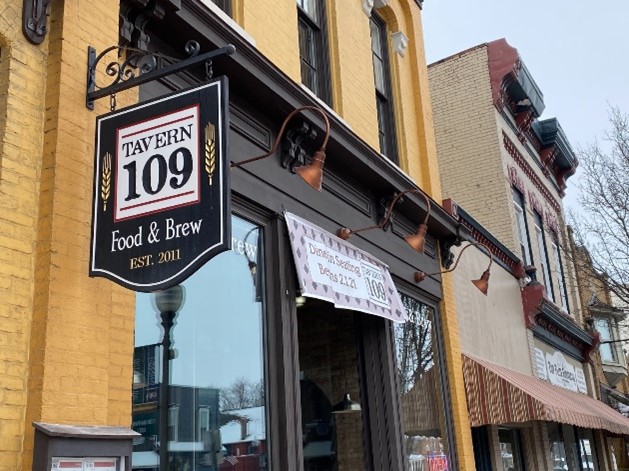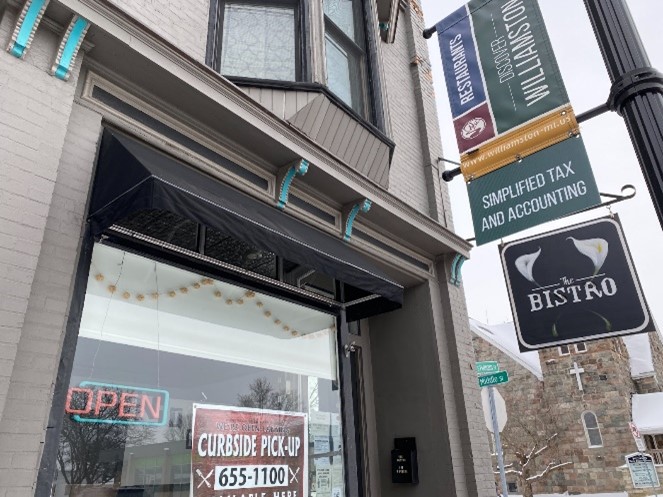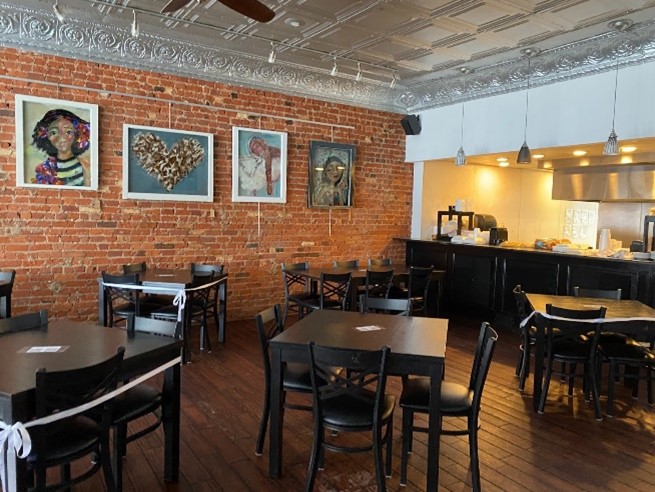
Tavern 109 is a restaurant located at 109 E. Grand River Road in Williamston. Employees sanitize tables after guests finish their meal.
Since the start of the COVID-19 pandemic, city departments, restaurants, schools, businesses and families are spending more money on personal protective equipment, cleaning supplies and technology.
City Manager, Corey Schmidt, said gas and sales tax revenue for Michigan has rebounded from when it noticeably dropped in the first couple months of the pandemic. This means Williamston and other cities will get revenue from the state that will be closer to what it had been before the pandemic.
The state and federal governments also provide PPE to first responders, lessening the cost for the city.
Schmidt said initially there were some minor increased expenses for sanitation supplies, PPE that they could not get from the government, and a Plexiglas shield for the front desk at city hall.
Restaurant expenses
While The Bistro restaurant was closed down during the COVID-19 pandemic, the owners renovated the building and included precautions to keep workers and customers safe.
“As opposed to just using a sanitizing spray, we now have to use a disinfectant that sits for 45 seconds, then wipe that down and sanitize over that,” said Assistant Manager of The Bistro, Paula Dodd.
Down the road from The Bistro, a restaurant called Tavern 109 provides several grab-and-go options for customers and maintains sanitizing stations around the restaurant.
“Any cost necessary to keep our staff and guests safe is what we put towards [PPE],” said Bonnie Warmels, owner of Tavern 109.

The Bistro is reopening for indoor seating and curbside orders on June 9.
Williamston Community Schools purchase more Chromebooks
Although the school district has received COVID-19 financial relief from state and federal governments in addition to donations from people in the community, the expense to provide Chromebooks and hot spots to students learning from home has impacted the overall budget.
Deputy Superintendent of Williamston Community Schools, Kelly Campbell, said there is some impact to the budget because they need enough devices for students learning at home and in-person.
The school also deals with lost and broken technology. When there is an issue with one of the Chromebooks, the technology department exchanges it for a different device and repairs the old one.
“We recognize that as we recoup many of these devices, some that are already back and those that will be coming back to us at the end of the year, we know that there have been some lost items, some damaged items, and so forth, Campbell said. And so, replacement costs and a plan for that are all things that they are working on factoring into the budget at this time.”
Williamston Community Schools purchase other technology
Williamston Community Schools pay for various kinds of software that they did not have as much need for prior to the COVID-19 pandemic.
Since the students take the Chromebooks home, the school district pays for security software that restricts access to inappropriate websites.
Director of Technology for Haslett and Williamston Community Schools, Jeff Cassin, said Williamston schools also pays an additional expense for the upgraded version of Google Suites because it provides additional features for Google Meet, an application similar to Zoom.
The school district also invested in webcams for teachers, administrators, and support staff. In the middle school and high school, classrooms are equipped with soundbars and 180-degree cameras that allow students to see the teacher and everything in the classroom.
“We certainly spent a lot more this year than we have on technology in the past,” Cassin said.
Families face financial roadblocks
Julia Brown has four children who attend Williamston Community Schools.
Brown said her family was fortunate in that they did not have to hire daycare or a tutor like many of her friends’ families because she can stay at home. However, she did spend a few hundred dollars on masks and cleaning supplies because one of her children is immune-compromised.
The school is not able to provide every household a hot spot, causing some families to have to look elsewhere for a reliable internet connection.
“We had to get a whole other internet added, which was another $100 a month because we couldn’t run four kids on what we currently had. We applied for a hot spot, but they were all out. We live out in the county so it’s really expensive and not easy to get good, functional internet out here,” Brown said.

Instead of hard copy menus, The Bistro restaurant at 151 S. Putnam St. in Williamston added a QR code to access the menu on each socially distanced table.
Spartan Newsroom Reporter, Olivia Santelli, explains that the COVID-19 pandemic has financially affected several institutions and families in Williamston because of the need to upgrade technology.